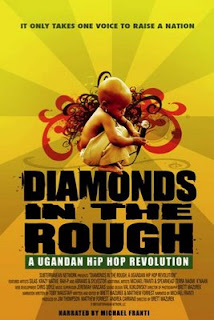baba Luku


Vancouver rapper looks to his African roots
When people think of Africa, they often think about poverty, hunger, and the HIV epidemic. But suffering is only half the story. What most people don't know about Africa is that there is a generation of youth coming up that's highly talented, creative, and motivated. All across the continent, this generation is channelling its energy and desire for change into hip-hop culture. It's not just a time of suffering in Africa, it's also a time of profound hope.
Vancouver rapper Babaluku has witnessed this movement firsthand. Babaluku, aka Mr. Africa, was born in the city of Kampala, Uganda, and immigrated to Ontario when he was 12 years old. His rhymes speak to the experience of being caught between two different cultures””what it felt like to be a young African growing up in small-town Canada. As a show of solidarity with his homeland, Babaluku raps in his mother tongue, Luganda. He is one of the pioneers of Luga Flow Flavor, a musical blend of African rhythms, soul, and hip-hop.
After years of longing to return to his country, Babaluku went back to Uganda last summer with his business partner””documentary filmmaker Aaron Elton””to investigate the hip-hop scene. The five-month trip was life-changing for him.
“I got off the plane and the smell of Africa hit me,”� he recounts over coffee on Granville Street. “It was an emotional time. In that moment, I felt like I let so much go””stuff that I was holding on to. I was back home.
“My mission in Africa was to check out the state of hip-hop,”� he continues. “But when we got there, my vision got bigger.”�
Unlike in other countries such as Tanzania and Kenya, hip-hop culture was still in its infancy in Uganda. Babaluku found that few artists were reaching out to youth who were eager to learn more about the art form, so he and Elton started organizing free concerts in the slums. With the help of local hip-hop star Krazy Native and his organization, the Ugandan Hip-Hop Foundation, they were able to put on numerous shows all over the city.
“We did one concert in the hospital for the HIV kids,”� Babaluku remembers. “When they called us to perform, they told us they wanted songs that would not remind the kids of their condition. But the reality is that these kids knew they had HIV.”�
One of Babaluku's fellow rappers insisted on performing a track that he wrote about his mother, who died of AIDS.
“And while he was performing it,”� he recalls, “the organizers got mad. But the funny thing was that in the middle of them rebuking us, all these kids were getting up and pulling a thousand shillings out of their pockets and taking it to him. When I was watching that, I was like, 'Do you think you can hide the fact from this kid? Look at him. He is taking the thousand shillings he has to say thanks for singing about my condition.' ”�
Babaluku also hit the studio while he was in Kampala with his crew Bataka Squad””which includes Krazy Native and a female MC named Tshila. (Some tracks are streamed on Babaluku's MySpace page: www .myspace.com/coolbabs/.)
“Twakubye”�, an upbeat dance joint that features Tanzanian MC Rah P, is a standout. The cut addresses those who doubt the power of Ugandan hip-hop, and highlights Babaluku's smooth, double-time flow against a backdrop of percussive beats.
“We, Bataka Squad, have really ventured out,”� he says of the recordings. “To take the form of hip-hop and shape it for Uganda, so that our people will be able to relate to it.”�
Tshila, for instance, has been working on merging traditional tribal music with hip-hop. “She went around the villages scouting for local instrumentalists and she's blending that with hip-hop in her own language,”� Baba?luku explains. “At the same time, she's playing acoustic and singing soul. The blend is crazy. It's something that Uganda has never heard.”�
In both recording and performing, Babaluku's main goal has been to help Ugandan hip-hop find its own unique voice. “I used to write rhymes in English, but the day that I started to write in my own language, everything started turning around mentally,”� he offers. “Now I could reach that kid in the village. He could know what I was talking about.”�
“Every stage I hit in Uganda, I never used English,”� the rapper adds. “A lot of people went back from Sweden, from California, and they're all rhyming like Jay-Z, all speaking English. When I hit the stage, my spirit would not let me speak English because I'm in Africa. I was chanting Luganda.
“I wanted to help build these kids self-esteem, to let them know that you can do hip-hop in your own language. You can reach out to your people. You've got to get out of this whole New York state of mind.”�
From these experiences, the Bavu?buka Foundation was born (www .bavubuka.com/). Babaluku and Elton launched the nonprofit to create opportunities for young people in Africa to express themselves. They hope to build a community centre and a youth camp in Kampala. The pair plans to return to Uganda this fall, bringing members of the North American hip-hop community with them.
“For me, as an African that has grown up in Canada, I take what I have learned here and share it with those kids in Uganda,”� Babaluku says. “I'm starting to network with a lot of African youth on this side of the world. I'm like, 'Yo, what do you do? Academics? Music? Whatever your gift is could change someone's life back home.' ”�

Comments